#Natural and herbal teas
Explore tagged Tumblr posts
Text
Slimming Detox Tea: This natural tea can eliminate obesity, the taste is also natural

Slimming Detox Tea: Made from natural and herbal ingredients. No harmful chemicals are used in this. Consuming it can also reduce weight.
Slimming Detox Tea: Considered very beneficial for weight loss. Nowadays almost everyone is troubled by the problem of increasing weight. Many diseases can also increase due to weight gain.
(Read More: Slimming Detox Tea: This natural tea can eliminate obesity, the taste is also natural)
0 notes
Text
HERBS for Digestive Health🌿
To help improve and ease digestive disorders and issues.
Ginger
widely used to treat nausea, bloating and soothe digestive issues
Turmeric
used for digestive weakness and inflammation
Chamomile
helps settle inflammation and anxiety related stomach issues
Fennel
great to reduce bloating, cramping and relax stomach muscles
helps break down food
Cinnamon
helps regulate circulation, blood sugar levels, and digestive function
Rosemary
supports healthy digestive functioning
Increasing your consumption of some of these even slightly could make a big difference over time! Should be used with caution.


#digestion#digestivehealth#gut health#herbs#medicinal herbs#herbal treatments#herbal tea#herbal#natural healing#health#healthy#healing#spirituality#witch community#witchblr#spiritual#herbs and spices#plants and herbs#tips#kitchen tips#natural medicine#stomach issues#stomach problems#digestive disorders#chamomile#ginger#fennel#rosemary#inflammation#digestive system
436 notes
·
View notes
Text
Ready to give your lungs a clean sweep?
Explore the 'Forbidden Lung Detox' and its potential to rid your lungs of harmful elements. The lungs are usually treated with these herbs. By dissolving old mucus and assisting you in clearing the mucus out by coughing, they naturally purify your lungs. If you smoke and have a persistent cough or excess mucus, try a natural lung cleanse.
Ingredients used: 👇
Mullein
Thyme
American Ginseng
Elderberry
Ginger
Instructions: 👇
Steep for a few minutes and strain.
If you're interested in this detox? Consider lööking into this brand, also on Amazon 👇
Or you can search for your own thing. Remember to start out slowly. 🤔
#pay attention#educate yourselves#educate yourself#reeducate yourselves#knowledge is power#reeducate yourself#think about it#think for yourselves#think for yourself#do your homework#do your own research#do research#do some research#ask yourself questions#question everything#detox#lung detox#for your health#health tips#healthy living#natural remedies#herbal tea#news
95 notes
·
View notes
Text





Mugwort Aesthetic 💚🌿
#aesthetic#nature#photography#nature photography#moodboard#naturecore#mugwort#tea aesthetic#herbalism
120 notes
·
View notes
Text

July 2023. One of the many moon gatherings. Wolverhampton, England ✨️
#mine#tagged mine#witch#witchy#divination#apothecary#spiritual#hippie#nature blog#forage#foraging#herbalism#herbalist#fairy#faery#faerie#faeriecore#fairycore#cottagecore#when our good friend jess foraged sooooo many plants and offered us teas#was such a lovely night
57 notes
·
View notes
Text
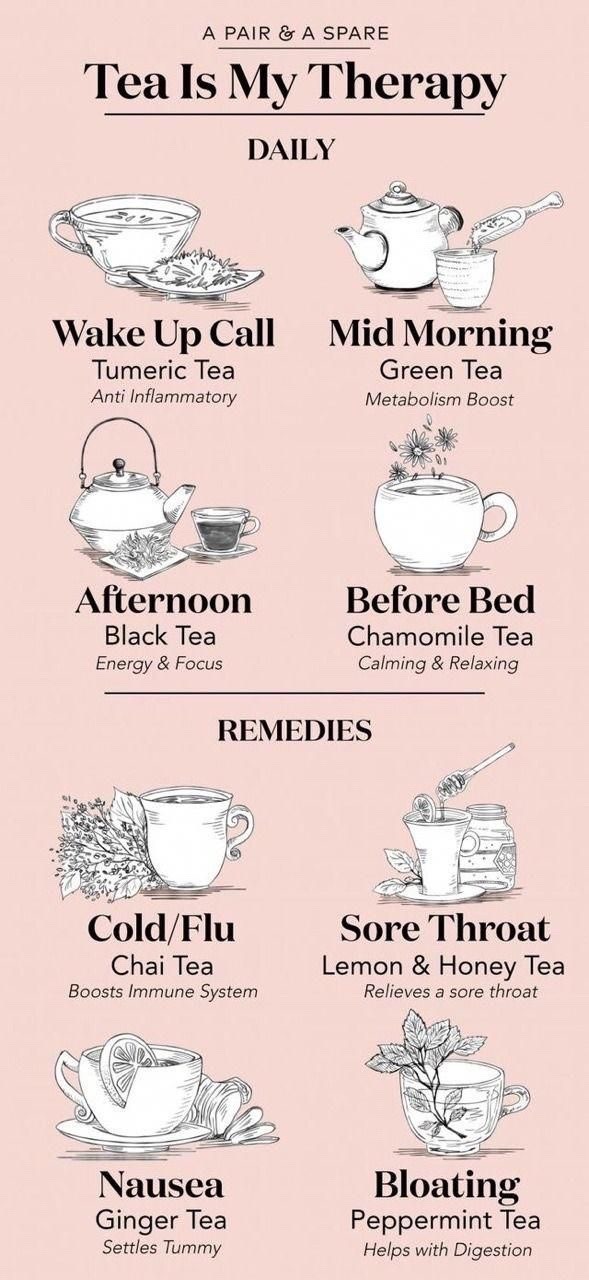
#spiritual healing#healing#pagan#nature#earth#self care#self love#tea#holistic practitioner#body postivity#gut health#herbal tea#health#wellness#not mine#photos
255 notes
·
View notes
Text
Tincture: A solution of alcohol and plant material. To create a tincture, you take the plant whos properties you wish to extract, put it in a container, and just cover it with a clear alcohol (needs to be at least 20% ethanol). Stir and let it sit for s few days to pull out as much as possible. Strain out the plant matter and the liquid you're left with is your tincture. If you want it more concentrated, you could leave it out without a lid, letting the alcohol evaporate naturally, or you could attempt a distillation, but you should do research for that to see what temperature the chemical you want evaporates at (this will tell you which solution will be your concentrated tincture, alcohol evaporates at a lower temperature than water).
Poultice: A mash of plant matter. This is simple and there are 2 ways to do this: dirty and clean. The dirty way is to chew the plant matter. An example of this is you're out hiking, you have an accident (non-life-threatening), and you're bleeding. You find some plantain near you, so you grab it. You chew the leaves until they're mush and place this over the wound. The clean way would have you grab a mortar, place the plant material in it, and mash it with the pestel, making sure to add water if it's too dry (you want it almost like a paste).
Salve: Similar to a poultice, but mixed with oil and something to set it. What you're after in the poultice is the juice that comes out of the plants more than anything, but having bits of the plant in the salve can be fine too, and salves can also be made with resin. You would mix the medicinal ingredient in with oil (you'll have to play with the ratio based on the plant and oil being used) and then melt in something like beeswax (start with a low wax to solution ratio first, add more wax if it doesn't set enough, too much wax will make the salve too hard).
Tea: Water steeped with plant material. This is a very simple one to understand. Doesn't even have to be plants even, turkey tail mushroom is a known medicinal tea ingredient (the jury is still out on its medicinal benefits, it's being looked into). The longer you steep, the more you leech (and the worse it may taste). You drink it right after steeping, it does not preserve itself.
None of these are going to make you a panacea, they're more than likely just going to help with more minor issues. For serious issues, seek more in depth medical help - scientific herbalism can only go so far. There's also a lot of science stuff I didn't include here about how certain chemicals might interact in the various methods, things like that very much depend on what's being used and what's desired. Make sure you do research on something before you try it, see what information is already out there about it. Contribute to the growth of open medical science by testing things, but be safe when testing - don't just ingest literal poison to see if it will cure cancer or something.
#herbalmedicine#herbalism#herbal tea#herbs#natural medicine#medicine#tincture#poultice#salve#tea#diy medicine#open science#open medicine#open medical science
30 notes
·
View notes
Text
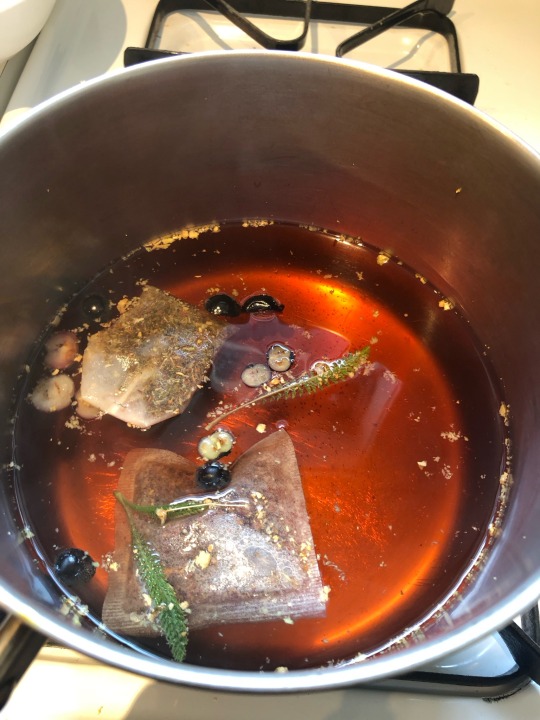
Menstrual Cramp Relief Tea 🫖
1 bag of raspberry tea
1 bag of chamomile & lavender tea
6 halved blueberries
A couple sprigs of yarrow
A tbsp Minced ginger root
I put it in about 32 ounces of water and I am drinking the whole thing. I just strain it but you can definitely put the ingredients in a tea bag or ball :)
#holistic#alternative#aesthetic#nature#period cramps#remedies#pagan#goddess#green#tea#green witchcraft#herbal remedies#oc#green witch
242 notes
·
View notes
Text


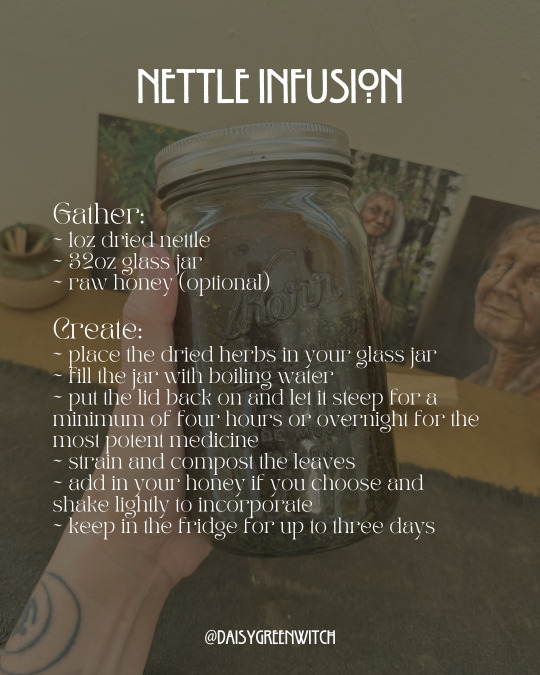
Nettle is such a gift from nature and by far one of my favorite herbs. It has so many uses and is such a nutrient dense powerhouse of an herb. Infusions are my go to way to use this herb but the possibilities are truly endless. 🌿
#green witch#green witchcraft#nature magic#nature witch#herbal magic#herbology#herbal tea#herbalism#herbalremedies#medicinal herbs#nettles
17 notes
·
View notes
Text






some process photos of me blending my all natural lemon room and linen spray! there is lavender in there too to add a bit of softness to the bright citrus mist. after this tincture has infused for at least 4 weeks it will be ready to bottle 💛💜
i also chose lavender to blend with lemon because they’re both immunity allies, with a penchant for perking people up when they’re feeling blue
this was so much fun to make, and so calming. yesterday i crafted *so* many new medicines and creations for Bloom Again. i prayed over the medicines throughout the whole day and told them how i love them✨ i thanked each of them for the joy of collaborating with their essences to craft blends that can help people 💓
herbal medicines have been a deep part of how i take care of myself for a while now. but there was quite a while when i was studying herbalism where i *knew* what medicines would be so helpful - but i couldn’t afford them. and that taught me why they are so important, what it’s like to need what you don’t have. one of my main missions within Bloom Again is to help that person - whoever they are and however divine need may express itself
it’s the anxiety tinctures that soften my frayed edges and keep me rooted firmly in myself. it’s the hydrosols that center me with fragrant beauty while i take care of my skin. it’s the spoonfuls of lavender honey in my tea. the hawthorn tincture that holds me when i Grieve and feel alone. it’s the herbal ghee that calms me down so i can sleep in true peace.
and sharing these things with others is what brings my heart to life ❤️🔥
#herbalism#lemon juice#lemons#lemon balm#lavender#herbs#herbal#floral#botanical#herbal tea#herbal witch#dried herbs#plants and herbs#homestead#apothecary#home apothecary#room spray#linen spray#natural cleaning products#natural fragrance#perfumery#perfume#tincture#tincturing#herbcraft#witchy vibes#witchy#magic aesthetic#cottagecore#beauty
11 notes
·
View notes
Text

tea time
#art#traditional#arabic#morning#tea#herbal#drink#warm#what are you describing#bear#otter#nature#tree#flower
19 notes
·
View notes
Text
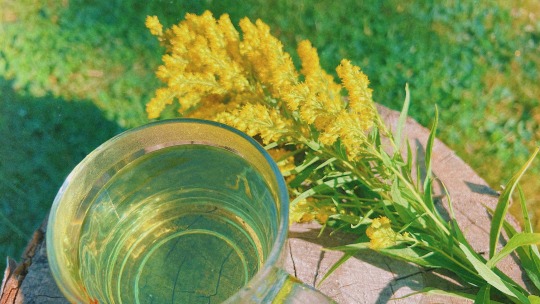



Finally tried goldenrod tea. Not a big fan. It kinda has a milky-like aftertaste. Last week, I tried marigold with chamomile, lavender, and oregano… I can see this going well in that mix. I also think it’ll be good with a slice of lemon and basil.
22-Aug-2022
#goldenrod#tea#herbal tea#cottagecore#wildflower#gardencore#garden#foraging#wild edibles#herbal#herbalism#plants#plantblr#nature#aesthetics#yellow aesthetic
102 notes
·
View notes
Text

#tea#herbal tea#herbal remedies#herbal#healing#natural healing#spiritual healing#self healing#healing herbs#herbs and spices#plants and herbs#medicinal herbs#spirituality#spiritualjourney#spiritual#herbs#mental health#healthy#health#self care#self love#witchblr#witch community#wicca#positive energy#energy healing#energy#manifestation#creativity#the universe
348 notes
·
View notes
Text
Randomly ranting ~
When I started my witchcraft practice, I got into the herbal part, and I used rosemary for EVERYTHING and still do, love rosemary prosperities and in general in my witch eat practice (the herb is dried when I get it from the store).
HOWEVER rosemary in my herbalism practice NASTY I cannot take it alone, cannot stand the smell, and it’s just weird to work with.
It full on took me for a whirl, I was taking by surprise. Big surprise. And I’m just like at a standstill, eye staring contest with it right now. I don’t know how to feel about it.
Okay thank you for coming to my red talk rant about rosemary.😂💜also if you had the same problem please comment because I’d like to know why rosemary is like that😭because the smell is atrocious when it is fresh or freshly dried to me…🥲
#witchblr#witchcraft#witch#baby witch#witchcraft community#witch community#magic#magick#witchcraft blog#nature#herbal remedies#herbs#herbal witch#herbalism#herbal medicine#medicinal herbs#herbal tea#herbalist
21 notes
·
View notes
Text

#me#mother nature#divinefeminine#kitchen witch#nature#soft black girls#black girl magic#black femininity#tea witch#herbal witch#self love#plant mama#plants
13 notes
·
View notes
Text
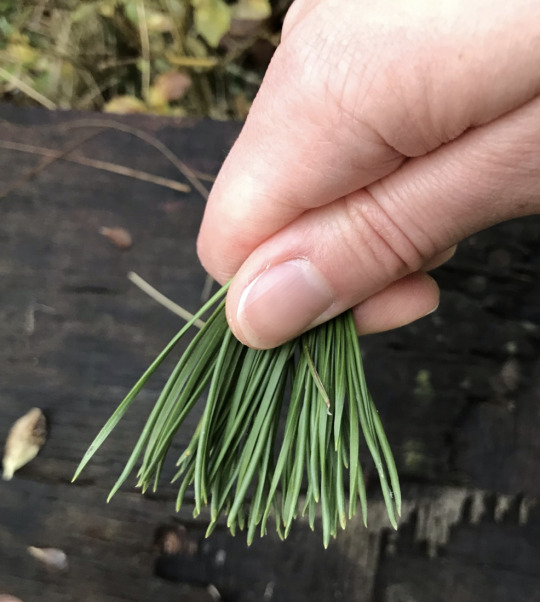



In the winter in southern England, evergreen trees like the Scots Pine (Pinus sylvestris) stand out. Ancient people saw the pine tree as a symbol of eternal life, which gave rise to our modern custom of Christmas trees.
The Scots Pine is the only native pine species in the British Isles. This species ranges from Western Europe to Eastern Siberia. The Scots Pine is only naturally found in Scotland in modern times, but in ancient times pine forests grew all over the British Isles. These forests died out due to climate change and human activity, but Scots Pine have been subsequently reintroduced as ornamentals and for forestry.
In these photos, we can see the two types of reproductive structures found on Scots Pine and other conifers. The classic pinecones are the female reproductive structures, known as ovulate cones, seed cones, or megastrobilus. These cones contain the ovules which will develop into seeds once fertilised by pollen. These cones open up their scales to allow wind blown pollen into the cones, after which the cones close up to allow the fertilised ovules to mature into seeds. After 6-8 months the cone opens again to let the winged seeds fly away on the wind to colonise new habitats. The second photo shows the male cones (microstrobilus or pollen cones) which contain pollen sacs under their scales. Scots Pine need to exchange pollen with another individual tree in order to reproduce.
Pine needles are also a delicious and healthy ingredient for herbal tea! Native Americans and East Asians have used pine needles from species in the Pinus genus for centuries as a healthy winter tonic. Pine needle tea is made by crushing and cutting the pine needles into small pieces and steeping them in boiling water. Medical research indicates pine needles are rich in antioxidants, vitamin A, and vitamin C. The taste is not like "pine scented air freshener" and more of a mellow citrusy flavour that combines exquisitely with cinnamon and gunpowder green tea. According to what I've read, all needles from Pinus genus species are safe for brewing unless you're pregnant.
#katia plant scientist#botany#plant biology#plants#plant science#pine trees#pine tree forest#tree#trees#scots pine#british nature#nature#foraging#herbal tea#pine needles#forestcore#naturecore#conifers#evergreens#english countryside#pine cones#branches#forest#woods#winter#wintercore#winter aesthetic
22 notes
·
View notes